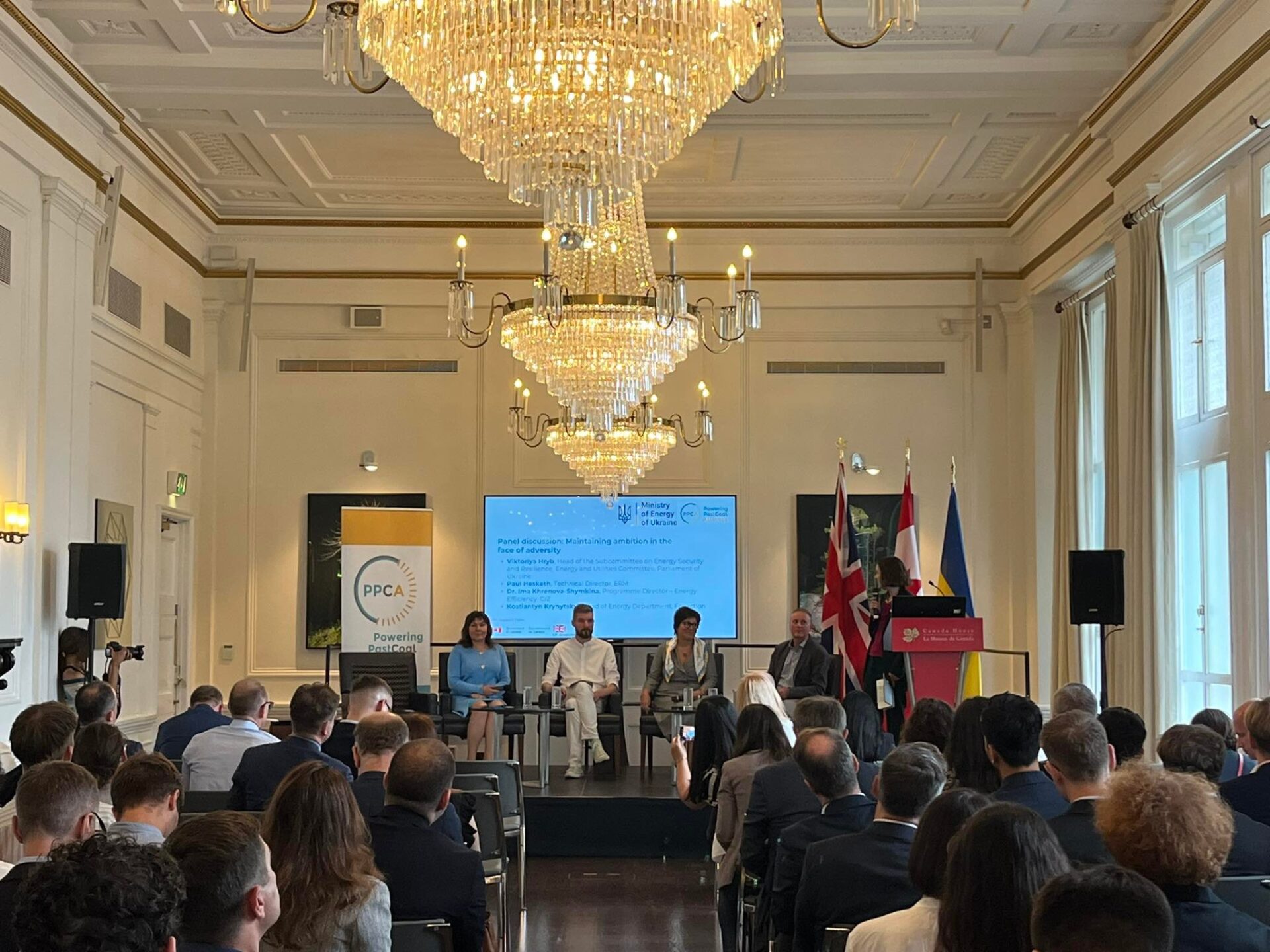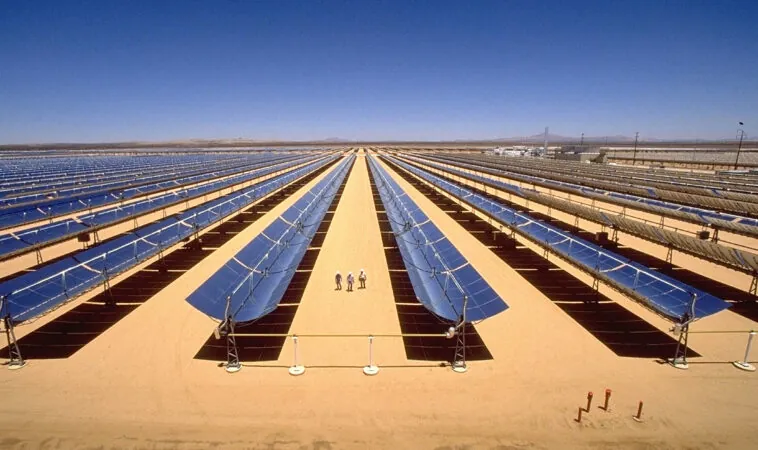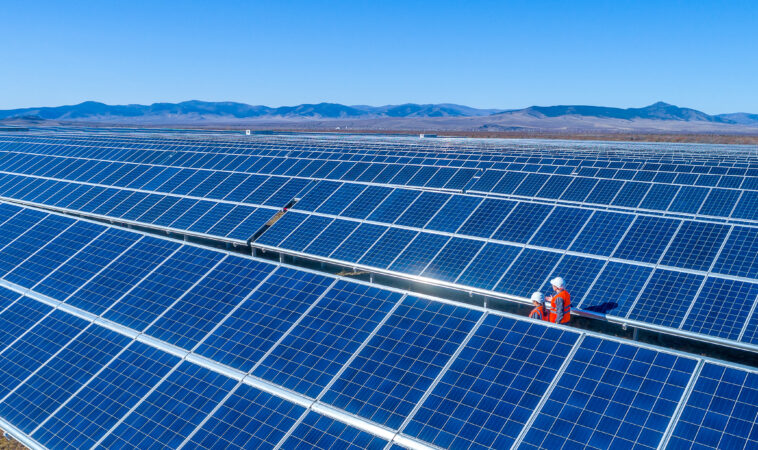
At an event organised by the Powering Past Coal Alliance (PPCA) and the Ukrainian Ministry of Energy in London today on the sidelines of the Ukraine Recovery Conference, the Ukrainian government has reaffirmed its commitment to phasing out state-owned coal power plants by 2035, made while joining the PPCA at the UN Climate Summit COP26 in Glasgow in November 2021.
For the first time, the government has also presented publicly a new energy strategy with ambitious goals to build a climate neutral energy system by 2050, while massively investing in decentralised renewables, enhancing energy efficiency and ensuring a just transition for workers and communities.
These are major steps for a country suffering severe damage due to Russian attacks, resulting in the disruption of vital services and posing a threat to the lives of its citizens, including the recent destruction of a major dam and hydroelectric power plant. By rebuilding in a sustainable, resilient way, Ukraine can safeguard its power supply for decades to come.
Yaroslav Demchenkov, Deputy Minister of Energy of Ukraine said:
“Russian forces have launched hundreds of attacks on our energy infrastructure, temporarily cutting off electricity, heat and water to millions. But for us, their relentless assault and the massive destruction that Russia has caused is also an opportunity to build back greener and stronger. We are committed to phasing out coal in power generation and reaching a carbon-neutral energy mix. This will strengthen our energy security and boost the recovery of other industries and services in Ukraine.”
Building a clean, resilient and just energy system as part of the post-war reconstruction of Ukraine will require international collaboration. The PPCA and its members aim to play a leading role in the country’s energy transition by providing technical and financial support on issues such as just transition, mine closures or energy efficiency.
Graham Stuart, Minister for Energy Security and Net Zero, United Kingdom, said:
“Ukraine’s message to the world today is clear: that energy security will be at the heart of its rebuilding of the country after Putin’s unprovoked invasion.
By reaffirming its pledge to eradicate coal from its energy system, Ukraine is looking to a future of cleaner, cheaper and more secure home-grown sources, boosting its energy security and cutting its emissions.
We have almost eradicated coal from the UK’s energy mix and stand ready to share our experience so Ukraine can do so too in the coming years.”
Steven Guilbeault, Canada’s Minister of Environment and Climate Change and PPCA co-chair said:
“Canada strongly condemns Russia’s illegal, unjustifiable and unprovoked invasion of Ukraine. Remarkably—amid all the chaos and hardship — Ukraine remains committed to ending coal power. Canada proudly stand beside Ukraine as it reconfirms its 2035 coal phase-out date. Let’s make 2023 the year that countries around the world step forward and say “no” to new unabated coal power.”
Ima Khrenova-Shymkina, “Promotion of Energy Efficiency and Implementation of the EU Energy Efficiency Directive in Ukraine” Project’ Director, GIZ GmbH said:
“Currently, Ukraine is working towards bringing closer EU membership and recovery. Recovery is our chance for new life and that is why it should be based on energy efficiency principles. We must develop legislation that will not only take into account the challenges of war, but also meet European standards for green recovery and ensure the country’s energy-independent and sustainable future. Here I would also like to underline the important role of international partners in the recovery process, and especially the support provided by the German Government in the field of energy efficiency.”
The war has exacerbated problems faced by coal mining communities in Ukraine. The destruction of critical infrastructure and the flooding of mines resulting from the war added to the already severe environmental problems caused by the coal industry. A just transition of these communities requires a joint effort of the national government, civil society, local communities and the private sector.
Andrii Zalivskyi, Mayor of Chervonohrad, a coal-mining town said:
“We have started the process of a just transition because we want to become a town of sustainable, green energy. Chervonohrad is open to investments, to new businesses that could produce heat pumps, solar panels or other renewable energy installations in our community. Ukraine is an EU candidate country now, so that means we need to fulfil all the tasks placed in front of us, decarbonisation being one of them. We want to become a worthy partner and transform our coal industry.”
Kostiantyn Krynytskyi, Head of Energy Department at Ecoaction, a Ukrainian NGO said:
“Just transition must be one of the main principles of Ukraine’s green and sustainable post-war reconstruction. Before Russia’s full-scale invasion our country had a very vibrant process of planning its inevitable coal phase-out, both on the national and local levels. Now it’s a question of (re)building back better, using new technologies and standards, not being dependent on fossil fuels as an integral part of Ukraine’s energy security.”
ENDS
For more information, please contact:
Anna Drazkiewicz, PPCA Communications Manager, 00 32 487 32 45 62, anna.drazkiewicz@poweringpastcoal.org (in Brussels)
Fiona Lavroff, PPCA Communications Officer, 00 32 489 99 80 76, fiona.lavroff@poweringpastcoal.org (in London at the event)
The Powering Past Coal Alliance (PPCA) is a coalition of national and subnational governments, businesses and organisations working to advance the transition from unabated coal power generation to clean energy.




